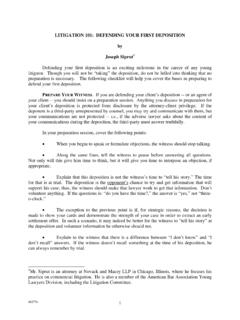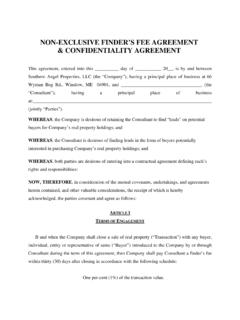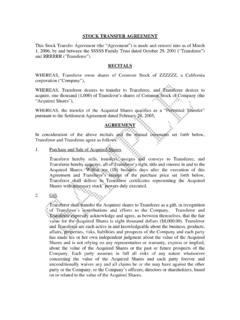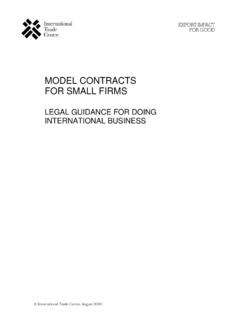Transcription of Third-Party Beneficiary Basics - Siprut PC
1 Consider also the case of a once happy husbandand wife who now seek a divorce, and whose mar-riage has produced three children. The settlementa g reement between the husband and wife obligatesthe husband to provide for the educational expens-es of the children. Later, before and while thec h i l d ren attend college, the husband suffers great fi-nancial hardship and makes no payments towardthe childre n s college wife ultimately sympathizes with the hus-b a n d s plight, and the two of them modify the set-tlement agreement to relieve the husband of his ob-ligation. Can the children nevertheless sue their fa-ther for breach of the settlement agreement withtheir mother and recover their college expenses? These hypotheticals raise a fundamental and im-p o rtant question of contract law: when can a third - p a rty stranger to a contract acquire legally cogniz-able rights under the contract?
2 This article addre s s-es these and related issues concerning such third - p a rty Beneficiary claims. 1_____Joseph Siprut <sipru t j @ h o w re > is an attorney inthe Chicago office of Howrey that a company enters into an agreement with a developer to rent space in a new building currently under design. Suppose further that the contract between the developer and his architect contains a provision statingthat the new building will be for the use of all future tenants, and pro v i d e sthat the architect must consult jointly with the developer and tenants concerning cert a i ndesign issues. If the architect subsequently breaches the agreement with the developer and the building is never constructed, can the company sue the architect for damages?SBy Joseph SiprutWhen can a noncontracting party sue directlyunder the contract as a Third-Party Beneficiary ?
3 Can the child of divorced parents force Dad topay college expenses, which he promised Mom in the settlement agreement he d do? Find out how and when to use this theoryon behalf of your Beneficiary Basics : When Can Noncontracting Parties Sue for Breach?When can a noncontracting party sue directlyunder the contract as a Third-Party Beneficiary ?Can the child of divorced parents force Dad topay college expenses, which he promised Mom in the settlement agreement he d do? Find out how and when to use this theoryon behalf of your h i rd - p a rty beneficiaries generallyThe well-established rule in the vastmajority of jurisdictions is this: if a con-tract is entered into for the direct benefitof a third person, that third person maysue for a breach of the contract in his orher own name, even though the thirdperson is a stranger to the contract andthe contractual principle is widely acceptedt h roughout the United States because in those limited situations in which third - p a rty Beneficiary rights are found to ex-ist allowing a third - p a rty Beneficiary tosue the promisor directly is said to in-c rease judicial efficiency by removing theprivity re q u i rement, under which theb e n e f i c i a ry must sue the promisee, whothen in turn must sue the pro m i s o that said, the more diff i c u l tquestion becomes under what circ u m-stances such third - p a rty claims may beb rought.
4 Indeed, while third - p a rty claimsa re generally permitted in all jurisdic-tions, the criteria allowing them are rig-o ro u s .As a threshold matter, to recover as at h i rd - p a rty Beneficiary , the plaintiff mustfirst plead facts that establish the exis-tence of a contract. The elements of alegally binding contract are (i) an off e r,(ii) acceptance of that off e r, and (iii) con-sideration , any act or pro m i s ewhich is of benefit to one party or disad-vantage to the other. More o v e r, theremust be mutual assent, or a meeting ofthe minds, by the contracting parties onthe essential terms and conditions of thesubject about which they are established the existence of acontract, the plaintiff must then pro v ethat it was breached. After all, if the un-derlying contract has not been bre a c h e d and neither of the actual parties to thecontract has claims under it a strangerto the contract certainly cannot bringc l a i m s.
5 Thus far we have seen that any po-tential third - p a rty plaintiff must, if hechooses to bring claims under a contractbetween two other parties, first establishthe existence of a valid contract as be-tween those two parties and that the con-tract has been breached. But the third - p a rty plaintiff s work is just beginning. The law draws a distinction betweeni n t e n d e dbeneficiaries and i n c i d e n t a lbeneficiaries to a contract. Although thef o rmer have contractual rights (and canbring suit), the latter do test anon party must meet to qualify as an in-tended Beneficiary is strict:[ T ] h e re is a strong presumption that par-ties to a contract intend that the contract sp rovisions apply to only them and not tot h i rd parties. In order to overcome thatp resumption, the implication that the con-tract applies to third parties must be sos t rong as to be practically an express to a third - p a rty musta ff i rmatively appear fro mthe contract s language andf rom the circ u m s t a n c e s.
6 At the time of its execution,and cannot be expanded ore n l a rged simply becausethe situation and circ u m-stances justify or demandf u rther or other simply, a third - p a rt yto a contract may qualifyas a third - p a rty beneficiarywhen the pro m i s o r s liabil-ity to that third - p a rty aff i rmatively ap-pears from the contract s language andf rom the circumstances at the time of itse x e c u t i o n .A word of caution is also in ord e r. Itis often said that for a third party to havethe right to sue, the language of the con-tract must aff i rmatively make it clearthat the contract was made for the thirdp a rt y s direct is not to betaken lightly. Even when a third - p a rt yclearly benefits from a contract, that per-son will not be deemed a d i re c tb e n e f i c i-a ry unless the promisor evidences intentto be directly liable to that third - p a rt to a third - p a rty claimand the rule of vestingThe promisor may assert against thet h i rd - p a rty Beneficiary any defense thatthe promisor could assert against thep romisee if the promisee himself were su-ing on the , not only mustany potential third - p a rty Beneficiary es-tablish the existence and breach of acontract for which he was an intendedd i rect Beneficiary , but he must also dealwith any defenses to the alleged bre a c hthat the defendant-promisor may h e re is, however, an exception to therule that the promisor may assert any de-fense against the Beneficiary that he orshe could against the promisee.
7 Underthe so-called vesting doctrine, once at h i rd - p a rty Beneficiary s rights vest, theoriginal contracting parties cannot mod-ify or discharge those rights without theb e n e f i c i a ry s assent. The question ofwhether a third - p a rty Beneficiary s rightshave vested arises when the pro m i s o rand promisee the contracting parties attempt to vary or discharge the rights ofthe majority rule is that in the ab-sence of language in a contract makingthe rights of a third - p a rty Beneficiary ir-revocable, the parties to the contract re-tain the ability to discharge or modify therights of third - p a rty beneficiaries, with-out that third - p a rt y s assent, until thoserights vest in the third - p a rt y. Import a n t-l y, vesting occurs only when the third -p a rt y, without notice of the discharge ormodification, (i) materially changes hisposition in justifiable reliance on thep romise, (ii) brings suit on the pro m i s e ,or (iii) manifests assent to the promise atthe request of the promisor or pro m i s e e.
8 8 While Third-Party claims are permitted in all jurisdictions, Third-Party claimants must meet rigorous _ _ _ _ _ _ _ _ _1 .Olson v Etheridge, 177 Ill 2d 396, 404 (1997).See generally 17A Am Jur 2d Contracts 437 (2004).2 .Ball Corp v Bohlin Bldg Corp, 187 Ill App 3d175, 177, 543 NE2d 106, 107 (1st D 1989). See, ,P routy v Gores Tech Gro u p, 121 Cal App 4th 1225,1232 (3d D 2004); Zelber v Lewoc, 6 AD3d 1043,1045, 776 NYS2d 134, 136 (3d Dept 2004).3 .Ball Corpat 177, 543 NE2d at 107 (internal ci-tations omitted).4 .B a rney v Unity Paving, Inc, 266 Ill App 3d 13,19, 639 NE2d 592, 596 (1st D 1994), relying on Wa-t e rf o rd Condo Assn v Dunbar Corp, 104 Ill App 3d371, 373, 432 NE2d 1009, 1011 (1st D 1982).5 .See, , Kelleher v Kelleher, 21 Ill App 3d 601,316 NE2d 212 (1st D 1974). There, the plaintiff childpetitioned the court to compel his father to pay past-due child support.
9 The court found that because thepayments at issue were to be made to the mother al-beit for the benefit of the child the child did not havet h i rd - p a rty standing. The benefits were deemed to flowd i rectly to the mother and only indirectly to the child,and no third - p a rty action by the child could be main-t a i n e d .6 .O l s o nat 404, 686 NE2d at 566-67. 7 .Id. 8 .Id at 408-09, 686 NE2d at 568 (noting the ra-tionale underlying this rule is that parties to a contractshould remain free to amend or rescind their agre e m e n tas long as there is no detriment to a third party who hasp rovided no consideration for the benefit re c e i v e d )( i n t e rnal citations omitted). Id. at 410, 686 NE2d at569, quoting B o a rd of Ed of Community School DistNo 220 v Village of Hoffman Estates, 126 Ill App 3d625, 628, 467 NE2d 1064, 1067 (1st D 1984).
10 Seegenerally 16 Am Jur Proof of Facts 2d 55 (2004).T h i rd - p a rty Beneficiary law in actionHypothetical #1: must the tenant ben a m e d ?A rmed now with this founda-tional knowledge, let s re t u rn to the hy-potheticals that introduced this art i c l e .Can the tenant in the first hypotheticalbring suit against the architect for bre a c hof the arc h i t e c t s contract with the devel-oper? Probably yes. The facts of the first hypothetical arebased on Resnik v Curtis & Davis, Ar-chitects & Planners, , theIllinois Building Authority contractedfor architectural and other services inconnection with the construction of abuilding to be leased by the Authorityto the Illinois Department of PublicSafety for use as a correctional contract made frequent referenceto the IDPS, and directed that the ar-chitects consult with IDPS in designingthe building.








